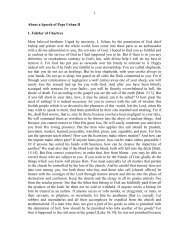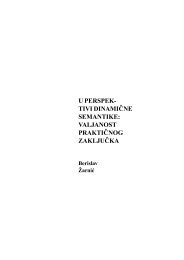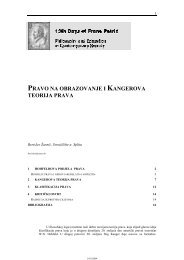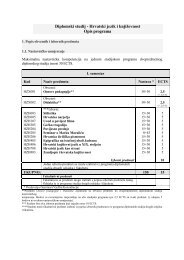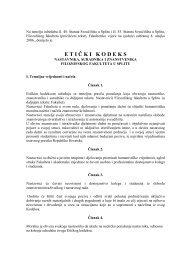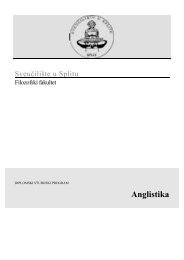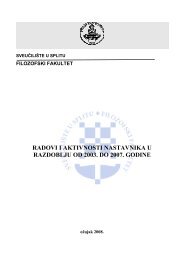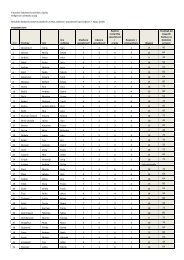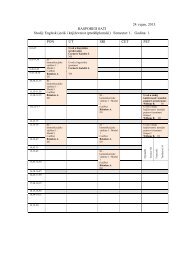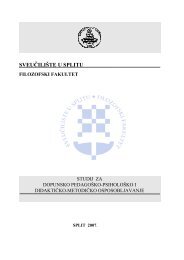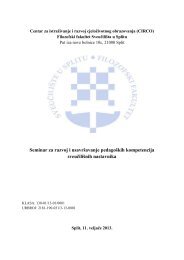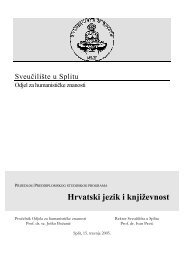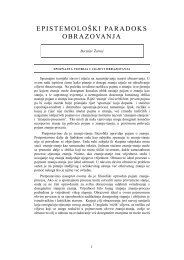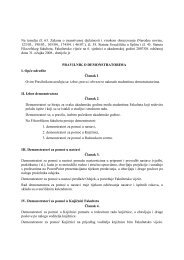English Studies
English Studies
English Studies
You also want an ePaper? Increase the reach of your titles
YUMPU automatically turns print PDFs into web optimized ePapers that Google loves.
G R A D U A T E D E G R E E P R O G R A M M E : E N G L I S H S T U D I E S<br />
Level of course<br />
Advanced<br />
Year of study First Semester Two<br />
ECTS<br />
(Number of<br />
credits allocated)<br />
Name of lecturer<br />
Learning<br />
outcomes and<br />
competences<br />
Prerequisites<br />
Course contents<br />
Recommended<br />
reading<br />
6 ECTS credits<br />
Contact hours (55 seminars + 5 advisory hours) = 1.5 credits.<br />
Student study time (135 hours) = 4.5 credits.<br />
Dr Borislav Berić<br />
Simon Ryle, MA, Guest Assistant<br />
Brian Willems, Assistant<br />
After the completion of the course, the student is expected to understand<br />
and be able to identify specific rhetorical processes at work in written and<br />
spoken language, particularly in the formation of argumentative language.<br />
The student should be able to analyse the types of rhetorical practices at<br />
work in a specified discourse.<br />
S/he is also expected to have developed the ability to apply such rhetorical<br />
techniques in the production of convincing argumentative speech and<br />
writing.<br />
Completion of the third year undergraduate study programme. Overall<br />
language competence at C1+ to C2 level.<br />
The course will be divided into three sections:<br />
I. A close look at rhetorical structure and the techniques used in the<br />
construction of written and spoken arguments. Techniques for the analysis<br />
of argumentative writing and speech will be introduced and applied in class<br />
discussion. The structure of written arguments will be analysed, with<br />
attention to logic, ethos, pathos, the application of evidence, and informal<br />
fallacies. Instruction in the application of such knowledge to the production<br />
of written arguments will be given. Students will be introduced to correct<br />
techniques of citation and the writing of a bibliography.<br />
II. An application of techniques in the analysis of persuasive writing<br />
concerning twentieth century issues: the critical reading of opposing views<br />
and the formulation of a critically satisfactory position. A system of debates<br />
will be initiated, where students will be asked to produce arguments<br />
formulated on various topics, and the relative merit of these will be peer<br />
evaluated in a jury-style process.<br />
III. The application of rhetoric in literary theory. An introduction to the<br />
major schools of literary criticism and the debates surrounding the<br />
production of literary criticism, to enable the application of critical rhetoric<br />
to the analysis of a literary text.<br />
Specific examples of rhetorical techniques in various genres of writing will<br />
be provided, including selections from:<br />
Ramage, J.D. (Ed.). (2001). Writing Arguments. Boston: Allyn and Bacon.<br />
Various other examples of written arguments will be selected from the<br />
public domain. Introductions to schools of literary criticism will be taken<br />
from:<br />
Lodge, D. (2000). Modern Criticism and Theory. Harlow: Longman.<br />
Literary texts applicable to rhetorical analysis will be provided.<br />
28



